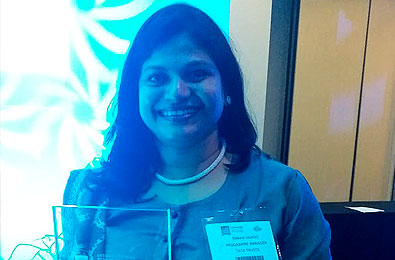Tejas
In 2000, the government of Maharashtra mandated the teaching of English as a second language from grade one onwards in all government-run schools. The intent was for students to be proficient in English so that they have access to better opportunities for higher education and employment. In 2011, the British Council collaborated with Tata Trusts to conduct an English-language teacher training programme. However, this was a traditional cascade model, with three to four levels of teacher training, which showed dilution of content over time. To overcome this challenge, it was decided to change to an internally-supported approach that promoted continuous professional development through the setting up of local communities of practice. This was inspired by the National Curriculum Framework for Teacher Education (NCFTE) 2009, which recommends creating spaces for sharing of experiences of communities of teachers among themselves.
The Trusts and the British Council partnered with the state education department in a government-run programme called TEJAS (Technology Enabled Education through Joint Action and Strategic Initiatives). TEJAS’s goal was to improve the proficiency of teachers teaching English across the state.
The initiative
Centred around teacher activity groups (TAG), TEJAS covers 18,000 teachers across schools in 9 districts of Maharashtra -- Amravati, Aurangabad, Beed, Gadchiroli, Hingoli, Nagpur, Nandurbar, Nashik and Yavatmal.
TAGs are groups of 20-25 primary school teachers from a cluster who meet on a monthly basis. A TAG coordinator, picked through a rigorous selection process by state officials and trained by British Council consultants, helps the group pick a topic for discussion from a resource guide developed by the British Council, along with in-class study material and online content. Based on this, teachers learn new ideas and techniques, share experiences and best practices, and provide each other with learning support. Each session ends with the participants completing a reflection and action planning sheet that helps to implement their learnings in the classroom.
Teachers connect with TAGs through WhatsApp groups and Facebook communities. Active participation in face-to-face meetings and digital communities helps them take ownership of their own professional development and improves their classroom teaching.
TAG coordinators are responsible for setting up and managing three TAGs in a cluster, facilitating meetings and reporting their progress on a monthly basis to the regional academic authority (RAA), a state-level government body responsible for English language teaching.
Teachers report to a cluster resource coordinator (CRC), who is responsible for coordinating TAG meetings, organising venues and recording and reporting attendance to the regional authority on a monthly basis. CRCs are also responsible for classroom implementation.
At state level, the British council has selected and trained a team of 25 master trainers with expertise in English. This team, known as state academic resource persons (SARPs), are based in the RAA to support TEJAS and future initiatives. SARPs observe and evaluate TAG meetings using tools developed by the British Council, establish TAGs and train TAG coordinators in the scale-up phase. They are also responsible for developing learner-centric English-language courses.
Key achievements
The Trusts reviewed TEJAS in October 2018, holding discussions with British Council consultants as well as SARPs, observing TAG coordinator trainings, attending TAG meetings, interviewing TAG coordinators and teachers and observing classroom practices.
The reviewers found that with the state investing considerable funds into the programme, RAA had turned into a well-staffed organisation with modern infrastructure and a committed leadership. The SARPs were highly-motivated, spoke fluent English, and could offer constructive feedback and mentoring to TAG coordinators. SARPs were also designing and delivering high-quality programmes and course materials incorporating modern techniques to the education department. As a result, several new initiatives were independently implemented. Reviewers also found TAG coordinators to be smart, well-trained, highly-committed, local-level motivators and supporters of community-of-practice.
In classroom observations, it was found that nearly 50% of teachers participated wholeheartedly in the TEJAS programme. Teachers who were interviewed were enthusiastic in their support for the concept of TAG, and felt that it helped them practice their own English, enabling them to communicate with students in the same language. They found resource materials provided by TEJAS such as ice breakers, language-learning activities, video clips, discussions and practice conversations to be useful tools in their classrooms. Teachers were also more adept at using the internet and technology for classroom teaching.
Read the Stories of Change in Marathi
Read the Stories of Change in English

